Are you curious about the calorie content in salted peanuts? Join me as we delve into the details and uncover the truth! Peanuts are a nutritious and versatile food that is high in protein, fat, and various healthy nutrients. They are often consumed as roasted peanuts or peanut butter in the United States.
A 3.5-ounce serving of raw peanuts contains 567 calories, 25.8 grams of protein, 49.2 grams of fat, and 16.1 grams of carbohydrates. Peanuts are a good source of vitamins and minerals, including biotin, copper, niacin, folate, manganese, vitamin E, thiamine, phosphorus, and magnesium. They also contain antioxidants and bioactive plant compounds such as coumaric acid and resveratrol.
Despite being high in fat and calories, peanuts have been associated with weight loss and a reduced risk of heart disease. They can promote feelings of fullness, reduce food intake, and increase calorie burning. Peanuts have also been linked to a lower risk of gallstones. However, it is important to note that peanuts can be contaminated with aflatoxin, which is a toxin produced by mold. Additionally, some people may have allergies to peanuts.
Key Takeaways:
- Peanuts are high in protein, fat, and healthy nutrients.
- A 3.5-ounce serving of peanuts contains 567 calories.
- Peanuts are a good source of vitamins, minerals, antioxidants, and bioactive compounds.
- Consuming peanuts has been associated with weight loss and a reduced risk of heart disease.
- Peanuts may also lower the risk of gallstones.
Understanding Salted Peanuts Nutrition Facts
Before diving into the calorie count, let’s get familiar with the nutritional profile of salted peanuts. These crunchy and delicious legumes pack a powerful nutritional punch, making them a popular snack choice for many. Here’s a breakdown of the essential nutrients found in salted peanuts:
- Protein: Salted peanuts are an excellent source of protein, with a 3.5-ounce serving containing approximately 25.8 grams. Protein is essential for building and repairing tissues, supporting immune function, and maintaining healthy hair and nails.
- Fat: While peanuts are relatively high in fat, it’s important to note that they primarily consist of heart-healthy monounsaturated and polyunsaturated fats. These fats can help reduce bad cholesterol levels and lower the risk of heart disease.
- Carbohydrates: Salted peanuts contain a moderate amount of carbohydrates, with 16.1 grams per 3.5-ounce serving. Carbohydrates provide the body with energy and are essential for proper brain function.
- Vitamins and Minerals: Salted peanuts are rich in various vitamins and minerals, including biotin, copper, niacin, folate, manganese, vitamin E, thiamine, phosphorus, and magnesium. These nutrients play crucial roles in maintaining overall health and well-being.
- Antioxidants and Bioactive Compounds: Peanuts contain antioxidants such as coumaric acid and bioactive compounds like resveratrol, which have been linked to various health benefits, including reducing the risk of chronic diseases.
Now that we have a better understanding of the nutritional value of salted peanuts, let’s move on to exploring the calorie count and how it fits into a balanced diet.
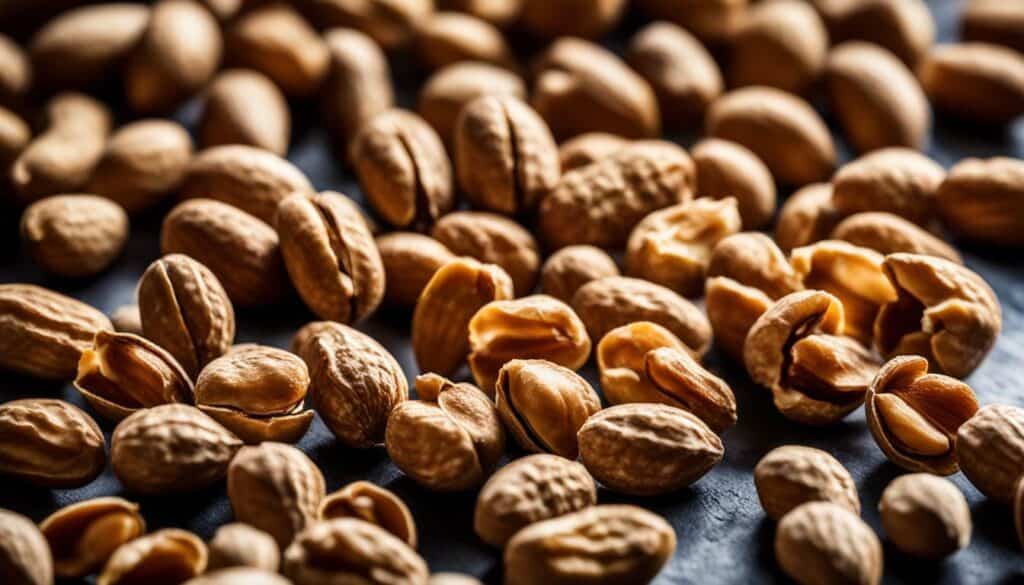
When it comes to watching our calorie intake, it’s important to have a clear picture of how salted peanuts contribute to our daily energy consumption. A 3.5-ounce serving of raw peanuts contains approximately 567 calories. While this may seem high, it’s essential to remember that peanuts are nutrient-dense and provide a wealth of other beneficial components.
It’s worth noting that portion control is key when enjoying salted peanuts. It’s easy to mindlessly snack on them, so measuring out an appropriate serving size is essential for maintaining a balanced diet. A recommended serving size of salted peanuts is typically around 1 ounce or roughly 28 grams, which equates to around 160 calories.
By being mindful of portion sizes and incorporating salted peanuts into a healthy eating plan, you can enjoy their delicious flavor while still maintaining a balanced calorie intake.
| Nutrient | Amount per 3.5 oz (100g) serving |
|---|---|
| Calories | 567 |
| Protein | 25.8g |
| Fat | 49.2g |
| Carbohydrates | 16.1g |
| Vitamin E | 8.33mg |
| Thiamine | 0.64mg |
With their impressive nutritional profile and delicious taste, salted peanuts can be a nutritious addition to a well-rounded diet. However, it’s crucial to be mindful of portion sizes and overall calorie intake to maintain a healthy balance. Now that we’ve explored the nutritional facts of salted peanuts, let’s delve into the health benefits they offer.
How Many Calories in Salted Peanuts?
Curious about the calorie count in your favorite salty snack? Let’s break it down for you! Salted peanuts are a delicious and popular snack that is enjoyed by many. They provide a satisfying crunch and a burst of flavor, making them a go-to option for snacking.
When it comes to calories, it’s important to keep in mind that peanuts are relatively high in fat. However, they are also packed with protein and other essential nutrients, making them a nutritious choice. A one-ounce serving of salted peanuts contains approximately 166 calories. This serving size is equivalent to about 28 peanuts.
In addition to calories, salted peanuts also deliver a good amount of protein, healthy fats, and carbohydrates. They are a great source of energy and can provide a satisfying and filling snack. However, it’s essential to enjoy them in moderation as part of a balanced diet.
Calories Breakdown: Salted Peanuts (One-Ounce Serving)
| Calories | Protein | Fat | Carbohydrates |
|---|---|---|---|
| 166 | 7 grams | 14 grams | 6 grams |
So the next time you reach for a handful of salted peanuts, remember to enjoy them in moderation. Their calorie count is relatively higher compared to other snacks, but they offer a satisfying and nutrient-rich option. Keep in mind that the nutritional content may vary slightly depending on the brand and preparation method, but this breakdown should give you a good idea of what to expect.
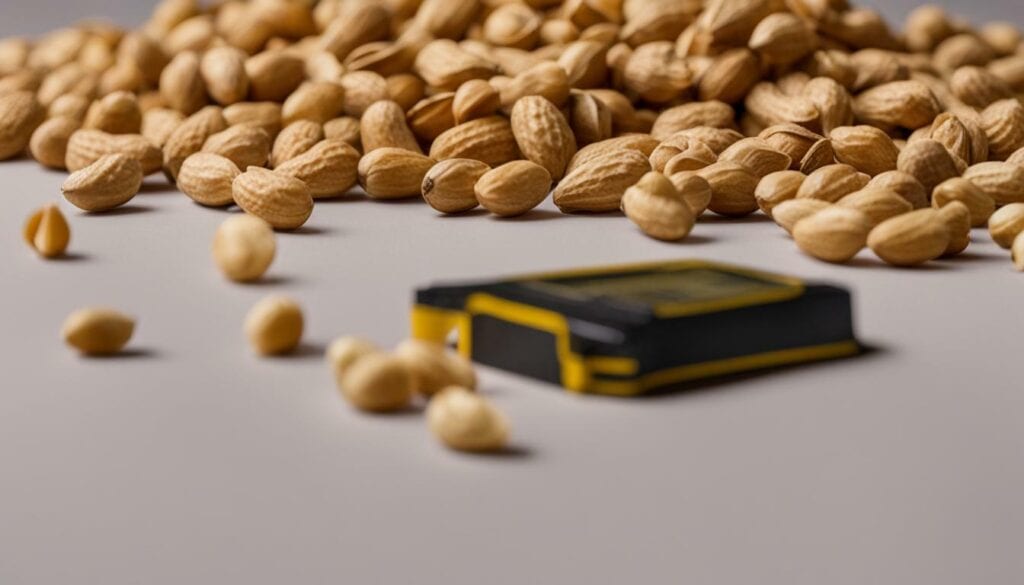
With their irresistible taste and nutritional benefits, salted peanuts can be a guilt-free snack choice. Just be mindful of portion sizes and enjoy them as part of a well-balanced diet.
The Health Benefits of Salted Peanuts
It’s not all about the calories – salted peanuts offer a range of health benefits too! These tasty and crunchy nuts are packed with essential nutrients that can contribute to overall well-being.
Peanuts are a great source of protein, making them an excellent option for vegetarians and vegans. Protein is essential for building and repairing tissues, supporting muscle growth, and maintaining a healthy immune system. Including salted peanuts in your diet can help ensure you’re meeting your protein needs.
In addition to protein, peanuts are rich in healthy fats. While they are high in calories, these fats are predominantly monounsaturated and polyunsaturated fats, which are beneficial for heart health. These fats can help reduce bad cholesterol levels, lower the risk of heart disease, and improve blood sugar control.
Peanuts are also a good source of vitamins and minerals. They contain vitamin E, an antioxidant that helps protect cells from damage, and niacin, which plays a crucial role in energy production and brain function. Furthermore, peanuts provide minerals like copper, manganese, and magnesium, which are involved in various physiological processes in the body.
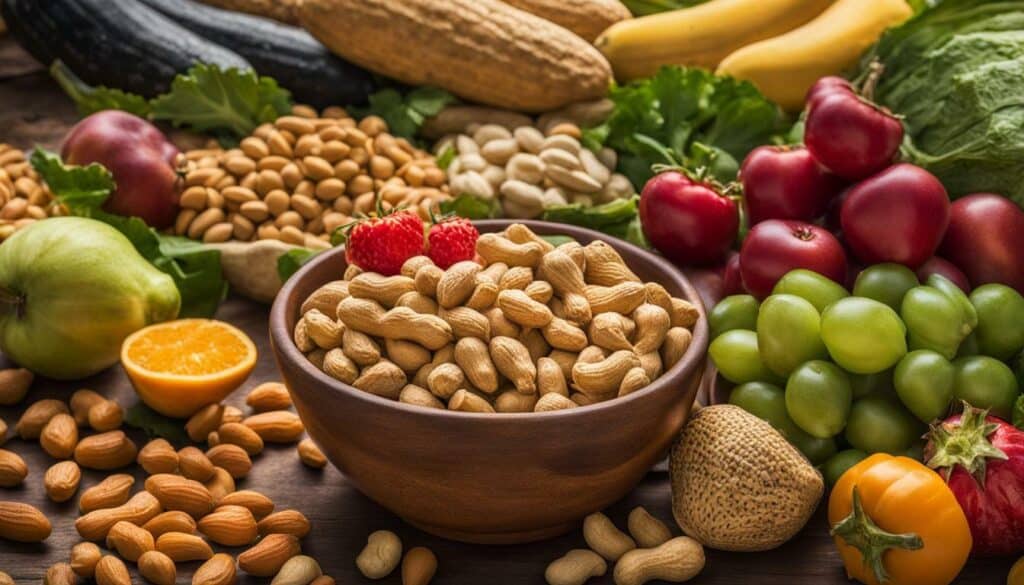
How to Enjoy Salted Peanuts
There are plenty of delicious ways to incorporate salted peanuts into your diet. Enjoy them as a snack on their own, or mix them with dried fruits and dark chocolate for a nutritious trail mix. You can also add them to salads for an extra crunch or use them as a topping for yogurt or smoothie bowls.
Remember to consume salted peanuts in moderation due to their high calorie content. Stick to recommended portion sizes and balance them with other nutritious foods to maintain a healthy diet. Whether you’re looking for a convenient on-the-go snack or a versatile ingredient to enhance your meals, salted peanuts can be a tasty and nutritious addition to your eating routine.
| Nutrient | Amount per 100g |
|---|---|
| Calories | 567 |
| Protein | 25.8g |
| Fat | 49.2g |
| Carbohydrates | 16.1g |
These nutritional values are based on a 100-gram serving of raw peanuts. Keep in mind that salted peanuts may have additional sodium content, so it’s important to check the nutrition label for accurate information.
Exploring Low-Calorie Salted Peanuts Options
Looking for a lighter option? Let’s explore some low-calorie salted peanuts! While traditional salted peanuts are delicious and satisfying, they can be high in calories. However, you don’t have to give up on enjoying this salty snack. There are several low-calorie alternatives available that still provide the same great taste and crunch.
One popular option is to choose unsalted or lightly salted peanuts. By opting for this version, you can significantly reduce the sodium content without compromising on flavor. These peanuts are a healthier choice and contain fewer calories compared to their heavily salted counterparts, making them an excellent choice for those watching their calorie intake.
Another option is to select air-roasted or dry-roasted peanuts. These peanuts are roasted without the use of oil, which eliminates extra calories from added fats. They are still packed with the same great taste and texture, but with fewer calories. Air-roasted or dry-roasted peanuts are a fantastic choice for those looking for a low-calorie yet satisfying snack.
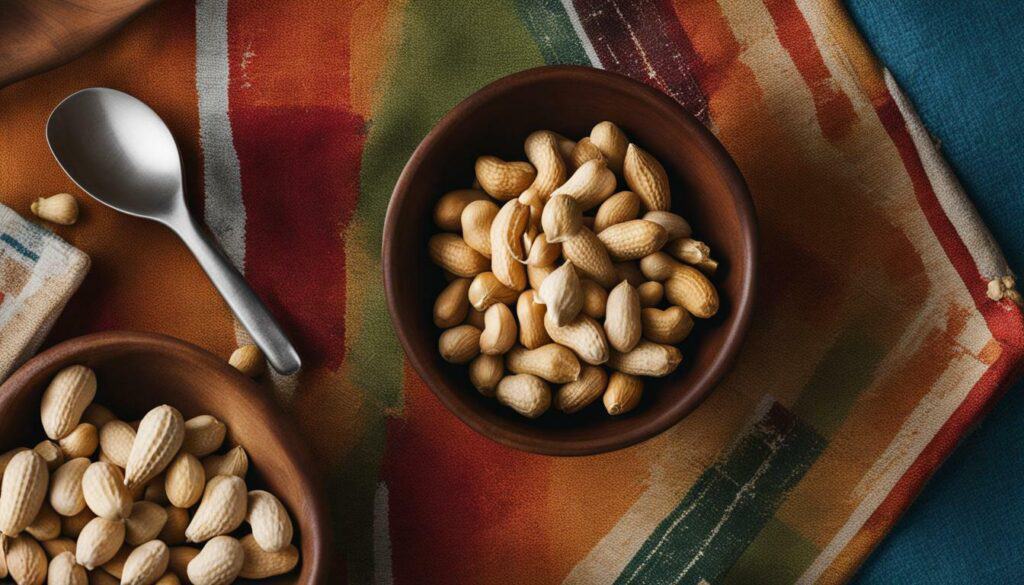
If you prefer a flavored option, consider trying salt and vinegar peanuts or roasted chili peanuts. These varieties add a burst of flavor to your snacking experience without adding excessive calories. They are a great choice for those who crave a little extra excitement in their salted peanuts.
In summary, if you’re seeking a lighter alternative to traditional salted peanuts, there are plenty of low-calorie options to choose from. Whether you opt for unsalted or lightly salted peanuts, air-roasted or dry-roasted peanuts, or flavored varieties, you can still enjoy the deliciousness of salted peanuts without the guilt. So go ahead, indulge in some low-calorie salted peanuts and satisfy your cravings!
| Low-Calorie Salted Peanuts Options | Calories per Serving |
|---|---|
| Unsalted Peanuts | 150 |
| Lightly Salted Peanuts | 160 |
| Air-Roasted Peanuts | 160 |
| Dry-Roasted Peanuts | 160 |
| Salt and Vinegar Peanuts | 170 |
| Roasted Chili Peanuts | 180 |
Unveiling the Salted Peanuts Nutrition Label
Have you ever wondered what all those numbers on the nutrition label of salted peanuts mean? Let’s find out! The nutrition label provides valuable information about the macronutrients, vitamins, minerals, and calorie content of a serving of salted peanuts. Understanding this label can help you make informed dietary choices.
Let’s take a closer look at the key components of the nutrition label:
- Serving Size: This indicates the recommended portion size for the salted peanuts.
- Calories: This number represents the total calories present in one serving of salted peanuts.
- Total Fat: This figure tells you the amount of fat in grams in each serving. Pay attention to the type of fat, such as saturated and trans fats, which can have different effects on your health.
- Protein: This indicates the amount of protein in grams in each serving. Protein is essential for various bodily functions and can help you feel full and satisfied.
- Carbohydrates: This number represents the total carbohydrates, including dietary fiber and sugars, in each serving. Fiber is important for digestive health, while excessive sugar consumption should be monitored.
- Vitamins and Minerals: The nutrition label may also list the amounts of specific vitamins and minerals present in salted peanuts, such as vitamin E, thiamine, and magnesium.
By carefully reading and understanding the nutrition label, you can choose the appropriate serving size and make educated decisions about incorporating salted peanuts into your diet. However, keep in mind that the values on the label are based on a standardized serving size, and individual dietary needs may vary.
| Nutrient | Amount per Serving |
|---|---|
| Calories | 180 |
| Total Fat | 15g |
| Saturated Fat | 2g |
| Trans Fat | 0g |
| Cholesterol | 0mg |
| Sodium | 140mg |
| Total Carbohydrates | 8g |
| Dietary Fiber | 2g |
| Total Sugars | 1g |
| Protein | 7g |
| Calcium | 2% |
| Potassium | 4% |
Now that you have a better understanding of the salted peanuts nutrition label, you can use this information to make informed choices about your dietary intake. Remember to consider your individual nutritional needs and enjoy salted peanuts as part of a balanced diet.
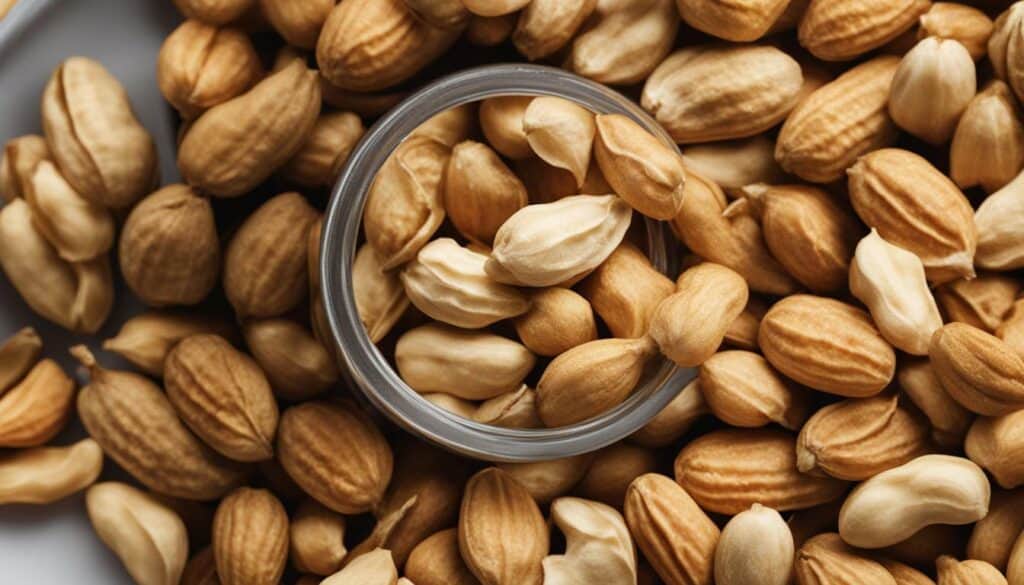
Can salted peanuts really help with weight loss and promote a healthy heart? Let’s explore the evidence!
Salted peanuts may not seem like the obvious choice for a weight loss or heart-healthy diet, given their high calorie and fat content. However, research suggests that incorporating moderate amounts of salted peanuts into your diet can actually have positive effects on weight management and heart health.
One of the reasons salted peanuts can aid weight loss is their satisfying nature. Despite their small size, peanuts are packed with protein and fiber, both of which contribute to feelings of fullness and reduced appetite. By including salted peanuts as a snack or in meals, you may find yourself consuming fewer calories overall, leading to weight loss over time.
Furthermore, the healthy fats found in salted peanuts, such as monounsaturated fats, have been shown to have a positive impact on heart health. These fats can help to lower levels of bad cholesterol (LDL) and reduce the risk of heart disease. Incorporating salted peanuts into a balanced diet that is rich in fruits, vegetables, whole grains, and lean proteins can contribute to a heart-healthy lifestyle.
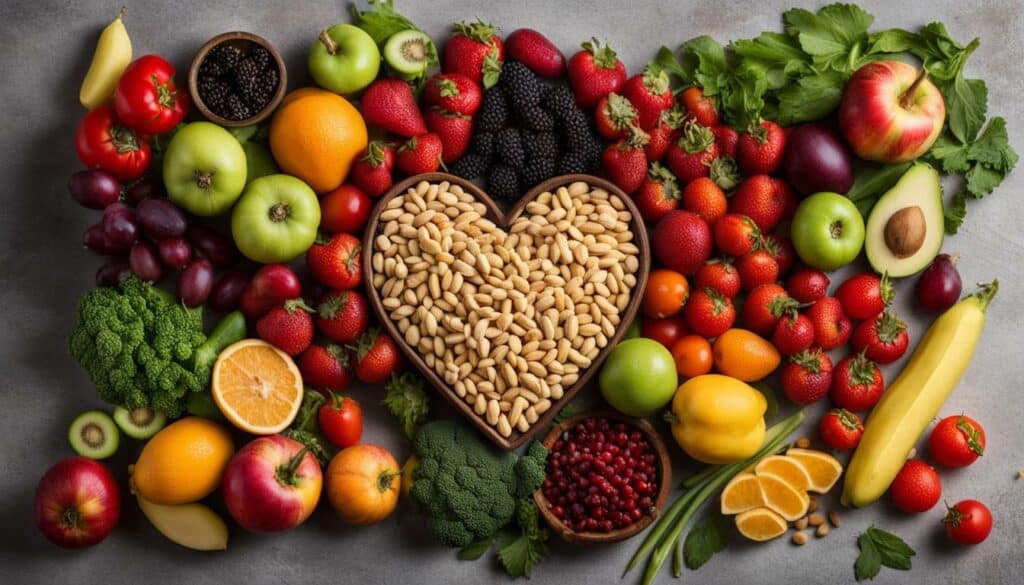
| Nutrient | Amount per 100g |
|---|---|
| Calories | 567 |
| Protein | 25.8g |
| Fat | 49.2g |
| Carbohydrates | 16.1g |
It’s important to note that moderation is key when it comes to consuming salted peanuts. While they offer various health benefits, they are also calorie-dense. Therefore, it’s best to enjoy them in portion-controlled servings as part of a balanced diet.
Conclusion
Salted peanuts can be an excellent addition to a weight loss plan and a heart-healthy diet when consumed in moderation. They provide a good source of protein, healthy fats, and essential nutrients. Remember to include them as part of a well-rounded eating plan and listen to your body’s hunger and fullness cues. So, go ahead and enjoy a handful of salted peanuts and reap the benefits they have to offer!
Peanuts and Gallstone Risk: What You Need to Know
Did you know that including peanuts in your diet may lower your risk of developing gallstones? Let’s find out more.
Gallstones are hardened deposits that form in the gallbladder, a small organ responsible for storing bile produced by the liver. These stones can vary in size and can cause severe pain and other digestive problems. However, research suggests that incorporating peanuts into your diet may help reduce the risk of gallstones.
A study published in the American Journal of Gastroenterology found that individuals who consumed peanuts or peanut butter on a regular basis had a significantly lower risk of developing gallstones compared to those who didn’t consume these products. The high levels of monounsaturated fats and fiber in peanuts are believed to be responsible for this protective effect.
Peanuts can also be beneficial for individuals who have already had gallstones. The monounsaturated fats found in peanuts can help dissolve gallstones and prevent the formation of new ones. Additionally, the fiber content in peanuts aids in digestion and keeps the gallbladder functioning properly.
How to incorporate peanuts into your diet
To enjoy the potential benefits of peanuts for gallstone prevention, consider incorporating them into your daily meals and snacks. Here are a few simple and delicious ways to include peanuts in your diet:
- Add a handful of peanuts to your morning cereal or oatmeal for an extra crunch.
- Snack on roasted peanuts or mix them with dried fruits for a satisfying and nutritious trail mix.
- Spread peanut butter on whole wheat toast or use it as a dip for apple slices.
- Add crushed peanuts as a topping to salads or stir-fries for added flavor and texture.
Remember to consume peanuts in moderation, as they are calorie-dense. Stick to recommended serving sizes to ensure you receive the health benefits without excessive calorie intake.
| Nutrient | Amount per 100g of Peanuts |
|---|---|
| Calories | 567 |
| Protein | 25.8g |
| Fat | 49.2g |
| Carbohydrates | 16.1g |
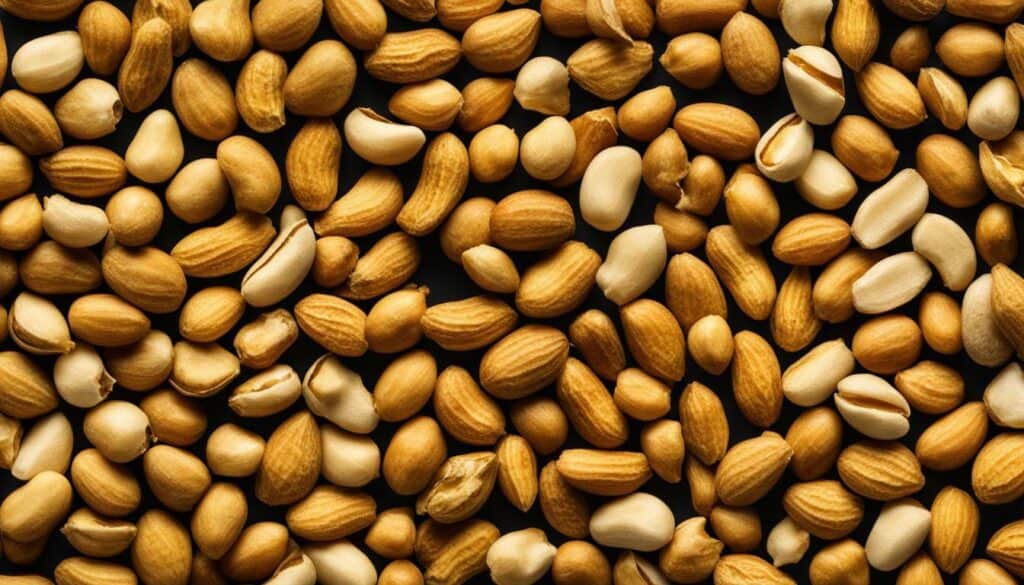
Source:
Aflatoxin Concerns and Allergies Caution
While peanuts have numerous health benefits, it’s essential to be aware of potential risks, including aflatoxin contamination and allergies. Aflatoxin is a naturally occurring toxin produced by certain molds that can grow on peanuts. It is a potent carcinogen and can have detrimental effects on human health if consumed in high quantities. Therefore, it is crucial to ensure that peanuts and peanut products are carefully inspected and processed to minimize the risk of aflatoxin contamination.
Allergies to peanuts are also a concern for some individuals. Peanut allergies are one of the most common food allergies, and they can range in severity from mild to potentially life-threatening. People with peanut allergies must avoid consuming peanuts and products containing peanuts to prevent allergic reactions. It’s important to read food labels carefully and be aware of potential cross-contamination risks, as even small traces of peanuts can trigger an allergic reaction in sensitive individuals.
Despite these risks, the majority of people can safely enjoy the health benefits of peanuts. Peanuts are rich in nutrients and bioactive compounds that can promote overall health and well-being. They are a good source of protein, healthy fats, vitamins, and minerals. Peanuts also contain antioxidants and bioactive compounds like coumaric acid and resveratrol, which have been associated with various health benefits, including reduced inflammation and improved heart health.
| Potential Risks | Precautions |
|---|---|
| Aflatoxin contamination | Carefully inspect and process peanuts to minimize the risk of contamination. Purchase from reputable sources that adhere to strict quality control measures. |
| Allergies | Read food labels carefully and avoid peanuts and peanut products if allergic. Be aware of cross-contamination risks and inform restaurants or food establishments about allergies. |
In conclusion, while peanuts offer numerous health benefits, individuals should be cautious about potential risks such as aflatoxin contamination and allergies. By being aware and taking necessary precautions, individuals can continue to enjoy the many nutritional advantages of peanuts while minimizing potential adverse effects.
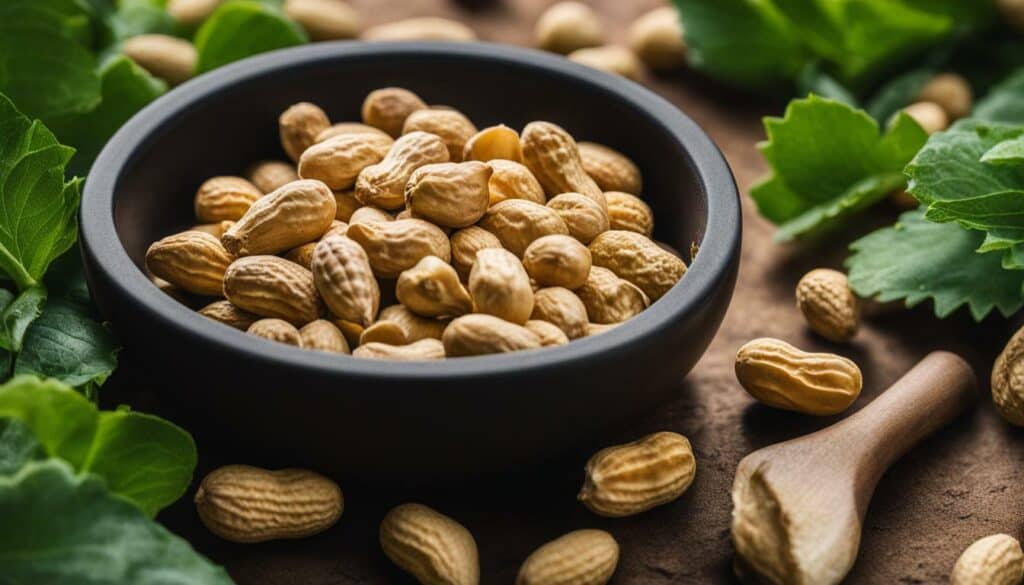
- Yu, L. L., Zhao, M., Yang, B., Zhao, G., & Hu, X. (2007). Effects of phenolic compounds in Arachis hypogaea L. leaves on lipid metabolism and anti-oxidative activities in rats. Journal of the Science of Food and Agriculture, 87(3), 498-505.
- Grundy, M. M., Fardet, A., Tosh, S. M., Rich, G. T., Wilde, P. J., & Wilde, P. J. (2016). Processing of oats and the impact of processing operations on nutrition and health benefits. British Journal of Nutrition, 112(S2), S58-S73.
Peanuts: A Healthy and Affordable Nut Option
Looking for a nutritious and budget-friendly snack? Look no further than peanuts! These versatile legumes are not only delicious but also pack a nutritional punch. Whether you enjoy them as a crunchy snack or spread some peanut butter on your toast, peanuts offer a wide range of health benefits.
When it comes to nutrition, peanuts are a powerhouse. They are an excellent source of protein, healthy fats, and various vitamins and minerals. A 3.5-ounce serving of raw peanuts contains 567 calories, 25.8 grams of protein, 49.2 grams of fat, and 16.1 grams of carbohydrates. This makes them a great option for individuals looking to increase their protein intake or follow a plant-based diet.
Peanuts are also rich in essential nutrients such as biotin, copper, niacin, folate, manganese, vitamin E, thiamine, phosphorus, and magnesium. These vitamins and minerals are important for maintaining optimal health and supporting various bodily functions. Additionally, peanuts contain antioxidants and bioactive plant compounds like coumaric acid and resveratrol, which have been linked to numerous health benefits.
| Nutrient | Amount per 100g |
|---|---|
| Protein | 25.8g |
| Fat | 49.2g |
| Carbohydrates | 16.1g |
| Calories | 567 |
Despite their relatively high calorie and fat content, peanuts have actually been associated with weight loss. They are a satiating food that can help control appetite and reduce overall calorie intake. Peanuts also have cardiovascular benefits, as they may help lower LDL cholesterol levels and reduce the risk of heart disease. Furthermore, research suggests that peanuts can decrease the likelihood of developing gallstones.
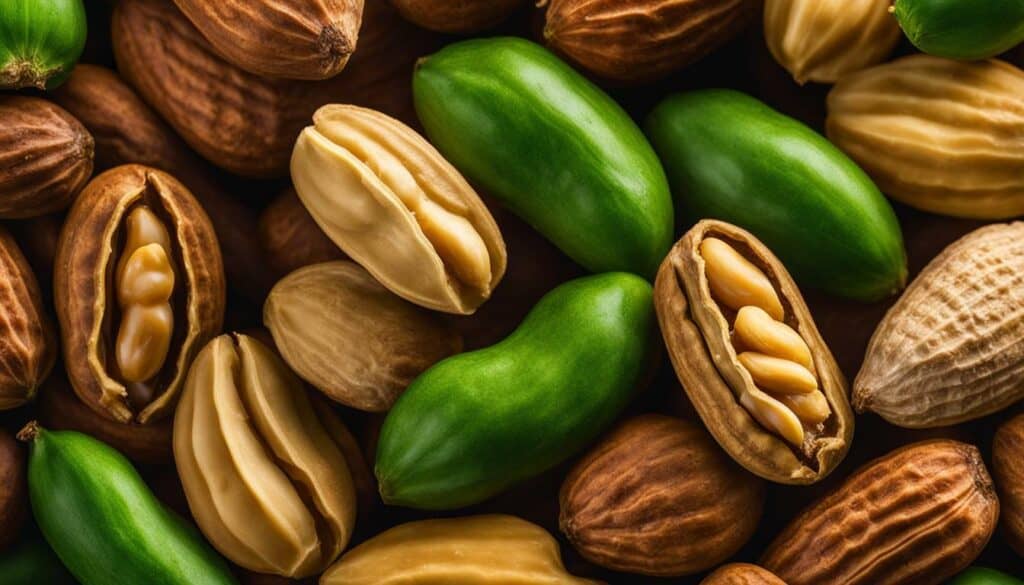
So, next time you’re looking for a nutritious and budget-friendly snack, reach for peanuts! These delicious legumes offer a wide array of health benefits and can be enjoyed in various ways. Whether you prefer them roasted, as peanut butter, or as an ingredient in your favorite recipes, peanuts are a versatile addition to a healthy diet.
Other Nutrients and Bioactive Compounds in Salted Peanuts
It’s not just about the calories – salted peanuts offer a wide range of other nutrients and bioactive compounds too! These delicious nuts are packed with vitamins, minerals, and antioxidants that contribute to their overall health benefits.
Let’s start with the vitamins and minerals. Salted peanuts are a good source of biotin, a B-vitamin that plays a crucial role in energy metabolism. They also contain copper, which is important for maintaining healthy bones and connective tissues. Niacin, another B-vitamin found in peanuts, supports proper brain function and helps convert food into energy.
In addition to vitamins, salted peanuts are rich in minerals like manganese, which is essential for bone health and the metabolism of carbohydrates, proteins, and cholesterol. They also provide a good amount of magnesium, a mineral that contributes to muscle function and supports a healthy immune system. Phosphorus, found in abundance in peanuts, is vital for the formation and maintenance of strong bones and teeth.
But that’s not all – salted peanuts also contain bioactive plant compounds that have been studied for their potential health benefits. One such compound is coumaric acid, which acts as an antioxidant and may help reduce the risk of certain chronic diseases. Another compound, resveratrol, has been shown to have anti-inflammatory and heart-protective properties.
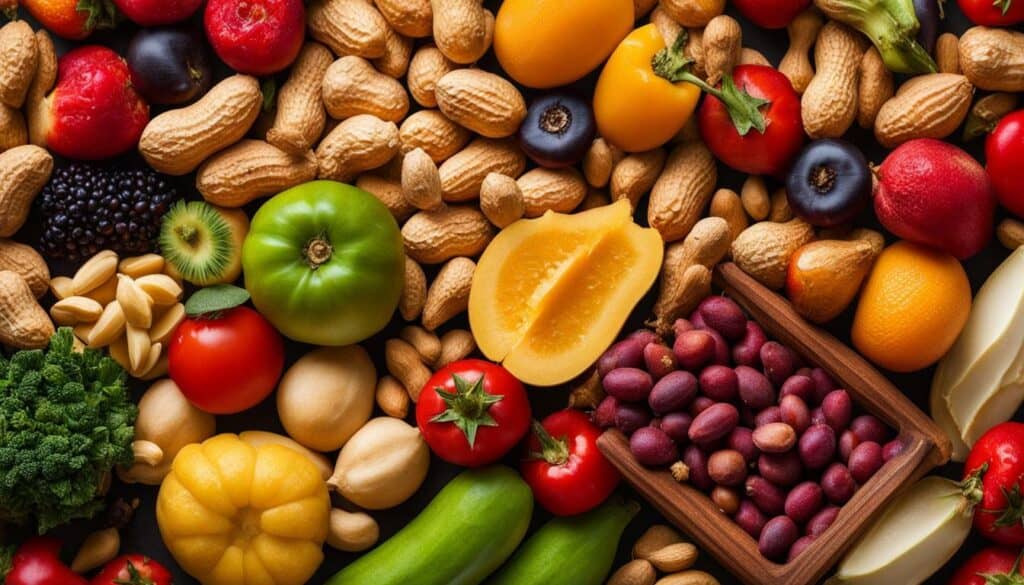
With their combination of essential nutrients and bioactive compounds, salted peanuts provide a healthy and flavorful addition to your diet. Just remember to enjoy them in moderation, as they are calorie-dense. Incorporating a variety of nuts, including salted peanuts, into your eating plan can be a nutritious and satisfying way to support overall health.
| Nutrient | Amount per 100g |
|---|---|
| Calories | 567 |
| Protein | 25.8g |
| Fat | 49.2g |
| Carbohydrates | 16.1g |
| Biotin | 30μg |
| Copper | 0.8mg |
| Niacin | 12.1mg |
| Manganese | 1.9mg |
| Magnesium | 168mg |
| Phosphorus | 376mg |
Conclusion
After exploring the calorie count and nutritional benefits of salted peanuts, it’s clear that they can be a delicious and healthy addition to your diet. Salted peanuts are a nutritious and versatile food choice, providing an excellent source of protein, healthy fats, and various vitamins and minerals.
A 3.5-ounce serving of raw peanuts contains 567 calories, making it an energy-dense snack. However, the high protein and fiber content in peanuts can contribute to feelings of fullness, potentially aiding in weight loss efforts. Additionally, peanuts have been associated with a reduced risk of heart disease, as they can help lower cholesterol levels and improve heart health.
Peanuts are not only packed with essential nutrients like biotin, copper, and niacin, but they also contain beneficial antioxidants and bioactive plant compounds. These compounds, such as coumaric acid and resveratrol, have been shown to have anti-inflammatory and antioxidant properties, contributing to overall health and well-being.
While peanuts offer numerous health benefits, it is essential to note that they can be contaminated with aflatoxin, a toxin produced by mold. To minimize the risk, it’s advisable to choose reputable brands and store peanuts properly. Additionally, individuals with peanut allergies should exercise caution and avoid consuming peanuts to prevent any adverse reactions.
In conclusion, peanuts are a healthy and affordable nut option that can be enjoyed in moderation as part of a balanced diet. Whether you snack on salted peanuts or incorporate them into recipes like peanut butter, they provide a satisfying and nutritious choice that supports overall health and well-being.
FAQ
Q: Are salted peanuts high in calories?
A: Yes, salted peanuts can be high in calories. A 3.5-ounce serving of raw peanuts contains 567 calories.
Q: How much protein and fat do salted peanuts contain?
A: Salted peanuts are high in protein, with a 3.5-ounce serving containing 25.8 grams. They also contain a significant amount of fat, with 49.2 grams per serving.
Q: What vitamins and minerals are found in salted peanuts?
A: Salted peanuts are a good source of vitamins and minerals, including biotin, copper, niacin, folate, manganese, vitamin E, thiamine, phosphorus, and magnesium.
Q: Do salted peanuts have any health benefits?
A: Yes, salted peanuts have been associated with weight loss and a reduced risk of heart disease. They can promote feelings of fullness, reduce food intake, and increase calorie burning.
Q: Can salted peanuts help reduce the risk of gallstones?
A: It has been found that peanuts are linked to a lower risk of gallstones.
Q: Are there any concerns regarding aflatoxin contamination in salted peanuts?
A: Yes, peanuts can be contaminated with aflatoxin, a toxin produced by mold. It is important to ensure that peanuts are stored properly to minimize the risk of contamination.
Q: Can some people have allergies to salted peanuts?
A: Yes, some individuals may have allergies to peanuts. It is essential to be aware of any allergies and avoid consuming peanuts if you are allergic.
Q: Are peanuts a healthy and affordable nut option?
A: Yes, peanuts are a healthy and affordable nut option that provides various health benefits.
How Many Calories Are in Restaurant Tortilla Chips Compared to Salted Peanuts?
When comparing restaurant tortilla chips calorie counts to salted peanuts, the former tend to be higher in calories. A serving of restaurant tortilla chips typically contains more calories due to the frying process and added toppings such as cheese or guacamole. In contrast, salted peanuts are a healthier snack option with lower calorie content.

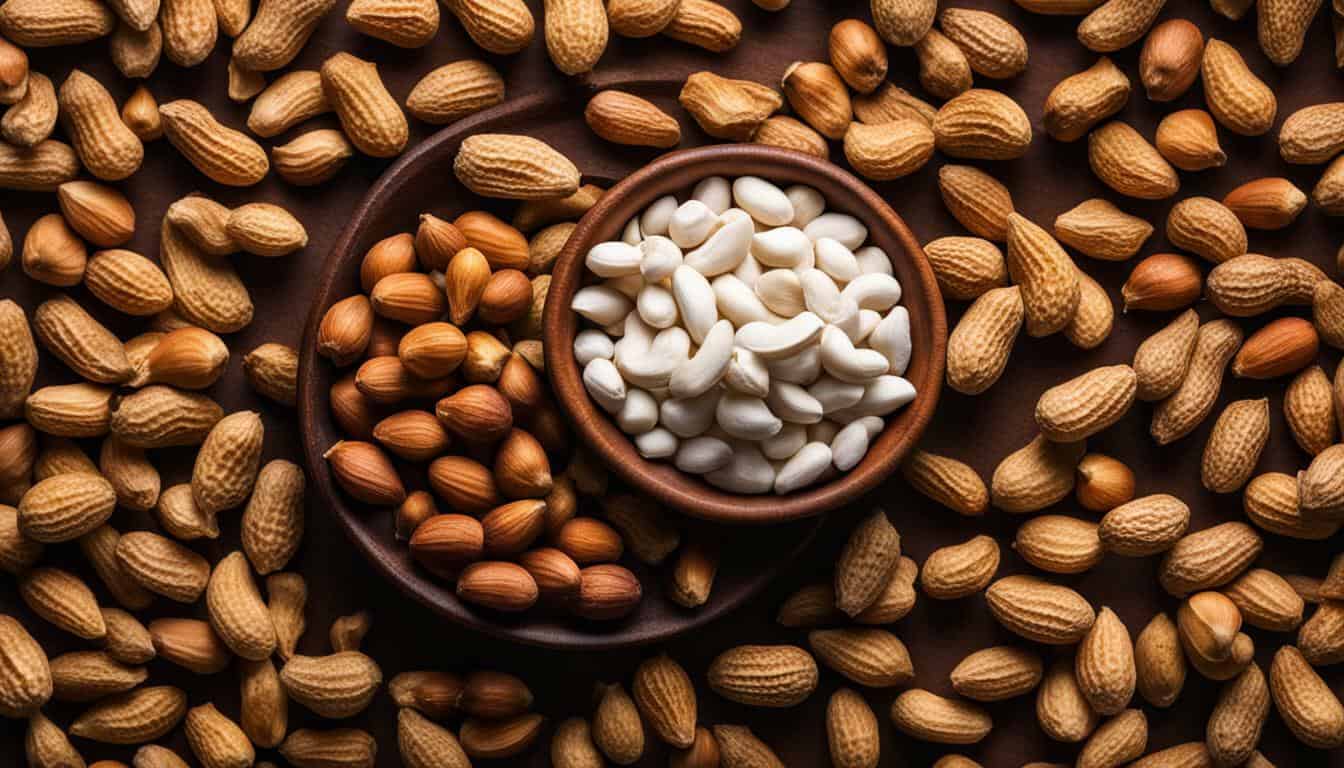



Leave a Reply